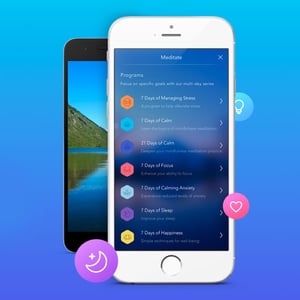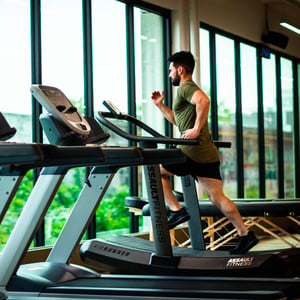6 Tips For Staying Healthy On Your Next Business Trip
The best way to stay healthy on the road? Preparation! Have plans to reduce stress, avoid germs, eat healthy, exercise, and beat jet lag.
Staying healthy on the road isn’t just about showing up to the office without sniffles. It’s also about reducing the stress of travel, maintaining good habits, and staying alert.
That’s not the easiest thing to do for business travelers, with the anxieties of work added to an already stressful endeavor. The following tips, however, can help.
1. Reduce stress with an app.
We tend to think of stress as a temporary thing: “I’m a little stressed right now.” But studies show stress can lead to both short- and long-term health problems ranging from headaches and gastrointestinal issues to diabetes and heart disease.

The act of traveling can stress you out, as can the anxiety of approaching a big business trip. While you should prioritize extra rest leading up to travel and outline clear goals to ease your mind, downloading a meditation or stress-relieving app is a good idea as well.
Calm offers a fairly comprehensive free trial that includes timed meditation options, along with calming “scenes,” like nature.
2. Pack hand sanitizer & disinfectant wipes.
Did you know that seat-back trays carry the most germs of any area of the plane? That’s not something travelers tend to prepare for, but they should, to avoid catching the common cold (which frequent flyers are more susceptible to). Here are some quick solutions to stay sniffle-free:
- Pack travel-sized disinfectant wipes, such as these from Clorox, in your carry-on bag. Wipe down your armrests and tray table once you’re settled.
- Once you arrive at your destination, make it a habit to apply hand sanitizer when you enter and leave locations.
- Consider wearing a mask through the airport and on the plane.
No one’s saying you have to turn into a hypochondriac, but you can never be too careful. After all, colds are miserable, work-killing ailments.
3. Plan ahead to eat healthy.
 Airport bars and restaurants tempt you with comfort food—a greasy burger or chicken tenders really hit the spot during a long layover. But that’s not the healthiest way to live, even if it is satisfying.
Airport bars and restaurants tempt you with comfort food—a greasy burger or chicken tenders really hit the spot during a long layover. But that’s not the healthiest way to live, even if it is satisfying.
Skip those added calories by eating a full meal before you head to the airport and packing healthy snacks. Protein bars, nuts, dried fruit, and apples make for great on-the-go food that won’t leave you feeling guilty (or lethargic, for that matter).
When at your hotel, research healthy restaurants nearby, or listen to the advice of noted traveler Emmitt Smith, who recommends ordering room service—grilled chicken or fish—to stay consistent with your diet.
4. Make time to exercise.
Technology is a wonderful thing. With a smartphone and a fitness app you can turn your surroundings—a quiet airport terminal, your hotel room, a city park—into your own personal gym. In less than 10 minutes, you can burn calories and relieve stress without disrupting your day.
 For the more fitness-inclined, plan an early morning or post-work workout in the hotel fitness center, most of which are open 24 hours and fairly comprehensive. If you want to escape the hotel, there are Planet Fitnesses everywhere, and a Black Card gives you access to almost all of them. Or find a local running group that enables you to explore a city while exercising.
For the more fitness-inclined, plan an early morning or post-work workout in the hotel fitness center, most of which are open 24 hours and fairly comprehensive. If you want to escape the hotel, there are Planet Fitnesses everywhere, and a Black Card gives you access to almost all of them. Or find a local running group that enables you to explore a city while exercising.
Whatever you choose, a good sweat goes a long way in keeping you physically and spiritually healthy.
5. Reduce the effects of jet lag.
Jet lag doesn’t always take effect after continental travel, but a switch of coasts can lead to grogginess. From the Mayo Clinic:
Jet lag can cause daytime fatigue, an unwell feeling, difficulty staying alert and gastrointestinal problems. Jet lag is temporary, but it can significantly reduce your vacation or business travel comfort.
A trip from New York to San Diego, and vice versa, at the very least, slows you down. So how do you combat it?
- Stay hydrated.
- Set your clock to your destination’s local time before you leave. If you land during the early evening on the West Coast, do your best to stay up to your “normal” bedtime.
- When should you sleep on long flights? It depends on the time and your destination. For example, if you’re leaving L.A. at night and heading east, sleep. If you’re going the other direction, stay awake. In other words, match your behavior to the local time.
6. Listen to your body.
Only you know exactly how you feel. If you are feeling groggy or sense a cold approaching, take some time to ease back into work. Strongly consider taking a half-day before or after your business trip to allow for recovery.
You could also schedule to arrive in a city one or two days ahead of schedule. This not only helps you adjust to any time-zone change but also gives you the opportunity to add a bleisure element to your trip. Studies show bleisure travelers enjoy a better work/life balance than non-bleisure travelers, and tend to be more focused on the road.



